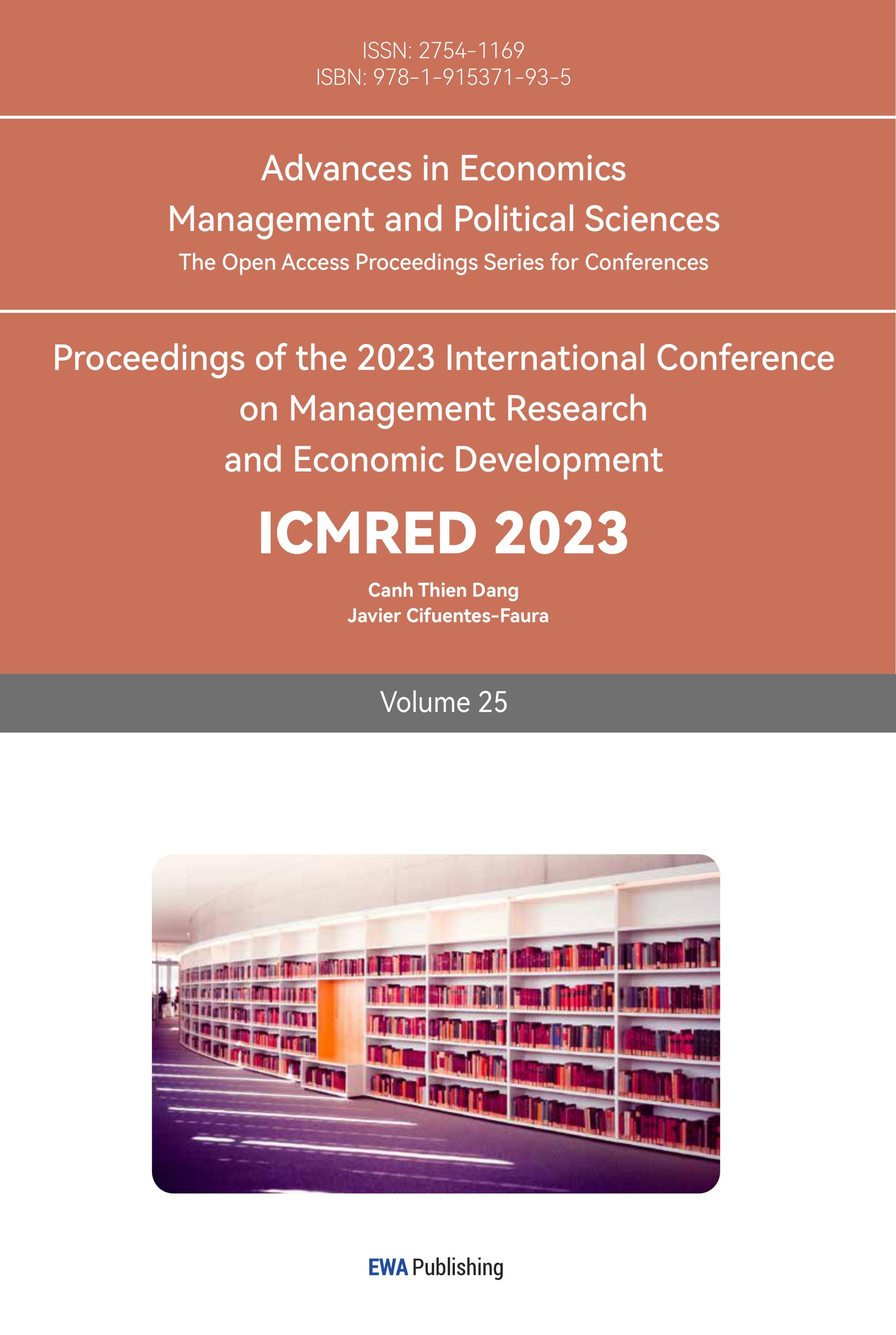References
[1]. Foxall, G.: Consumer psychology in behavioral perspective. Beard Books (1990).
[2]. Jiang, L., Jun, M., Yang, Z.: Measuring consumer perceptions of online shopping convenience. Journal of Service Management 2(24), 191-214 (2013).
[3]. Paulus, P. B.: Psychology of group influence. L. Erlbaum (1989).
[4]. Du, Z.: Analysis of "Double Eleven" shopping carnival phenomenon from the perspective of economics. (2021).
[5]. Cheng, X., Jiang, X.: Online retailing promotion strategy under platform scheme with considering seller competition. 15th International Conference on Service Systems and Service Management (ICSSSM) IEEE, (2018).
[6]. Chu, T., et al.: Unlocking the network traffic password of the sudden popularity of oriental selection: consumer behavior decision-making mechanism based on mental accounting theory. Psychology Research 11(2022).
[7]. Deng, L.: The status quo, problems and countermeasures of the E-commerce in our country. Proceedings of 2005 International Conference on Innovation & Management School of Management, Wuhan University of Technology, P. R. China, (2005).
[8]. Hantula, D., Wells, V.: Consumer behavior analysis: (A) rational approach to consumer choice. Routledge (2013).
[9]. Stern, P. C., Wolske, K. S.: Contributions of psychology to limiting climate change: Opportunities through consumer behavior – Science Direct. Psychology and Climate Change 127-160 (2018).
[10]. Mullen, B., Johnson, C.: The psychology of consumer behavior. Lawrence Erlbaum Associates (1990).
[11]. Fu, X.: China automobile consumption psychology and consumer behavior: Consumption characteristics of structure hierarchy and unity in diversity. Value Engineering (2011).
Cite this article
Shuai,J. (2023). The Marketing Strategy of Live Broadcast Based on Consumer Psychology. Advances in Economics, Management and Political Sciences,25,310-315.
Data availability
The datasets used and/or analyzed during the current study will be available from the authors upon reasonable request.
Disclaimer/Publisher's Note
The statements, opinions and data contained in all publications are solely those of the individual author(s) and contributor(s) and not of EWA Publishing and/or the editor(s). EWA Publishing and/or the editor(s) disclaim responsibility for any injury to people or property resulting from any ideas, methods, instructions or products referred to in the content.
About volume
Volume title: Proceedings of the 2023 International Conference on Management Research and Economic Development
© 2024 by the author(s). Licensee EWA Publishing, Oxford, UK. This article is an open access article distributed under the terms and
conditions of the Creative Commons Attribution (CC BY) license. Authors who
publish this series agree to the following terms:
1. Authors retain copyright and grant the series right of first publication with the work simultaneously licensed under a Creative Commons
Attribution License that allows others to share the work with an acknowledgment of the work's authorship and initial publication in this
series.
2. Authors are able to enter into separate, additional contractual arrangements for the non-exclusive distribution of the series's published
version of the work (e.g., post it to an institutional repository or publish it in a book), with an acknowledgment of its initial
publication in this series.
3. Authors are permitted and encouraged to post their work online (e.g., in institutional repositories or on their website) prior to and
during the submission process, as it can lead to productive exchanges, as well as earlier and greater citation of published work (See
Open access policy for details).
References
[1]. Foxall, G.: Consumer psychology in behavioral perspective. Beard Books (1990).
[2]. Jiang, L., Jun, M., Yang, Z.: Measuring consumer perceptions of online shopping convenience. Journal of Service Management 2(24), 191-214 (2013).
[3]. Paulus, P. B.: Psychology of group influence. L. Erlbaum (1989).
[4]. Du, Z.: Analysis of "Double Eleven" shopping carnival phenomenon from the perspective of economics. (2021).
[5]. Cheng, X., Jiang, X.: Online retailing promotion strategy under platform scheme with considering seller competition. 15th International Conference on Service Systems and Service Management (ICSSSM) IEEE, (2018).
[6]. Chu, T., et al.: Unlocking the network traffic password of the sudden popularity of oriental selection: consumer behavior decision-making mechanism based on mental accounting theory. Psychology Research 11(2022).
[7]. Deng, L.: The status quo, problems and countermeasures of the E-commerce in our country. Proceedings of 2005 International Conference on Innovation & Management School of Management, Wuhan University of Technology, P. R. China, (2005).
[8]. Hantula, D., Wells, V.: Consumer behavior analysis: (A) rational approach to consumer choice. Routledge (2013).
[9]. Stern, P. C., Wolske, K. S.: Contributions of psychology to limiting climate change: Opportunities through consumer behavior – Science Direct. Psychology and Climate Change 127-160 (2018).
[10]. Mullen, B., Johnson, C.: The psychology of consumer behavior. Lawrence Erlbaum Associates (1990).
[11]. Fu, X.: China automobile consumption psychology and consumer behavior: Consumption characteristics of structure hierarchy and unity in diversity. Value Engineering (2011).









